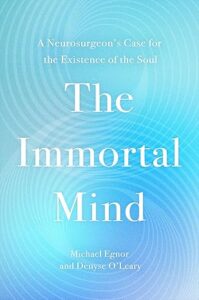The Immortal Mind, a new book by neurosurgeon Michael Egnor and science writer Denyse O’Leary, challenges some unexamined dogmas that dominate science classrooms and popular media — especially materialism, the theory that mind, spirit, and the soul are simply illusions and humans are mere meat machines. John Zmirak devoured the book and interviewed Egnor. Look for Parts 2 and 3 next week.
John Zmirak: I found yours to be a fascinating and persuasive book on a crucial subject. You lay out the issues starkly: Our current elites throughout the West have accepted a consensus that’s profoundly unsettling: The human soul doesn’t exist. Our minds, our sense of self, and our subjective experience are all secondary side effects – epiphenomena – of what’s genuinely real: the chemical and mechanical operations of our brains.
Dr. Michael Egnor: For millennia the greatest theologians, philosophers, and scientists — from Plato and Aristotle to Augustine and Aquinas to Copernicus and Newton and Faraday and Maxwell to Descartes and Kant and Kierkegaard — have argued convincingly for the existence of the immaterial, immortal soul. The traditional evidence and logic supporting the existence of the soul are overwhelming.
Modern neuroscience is an aberration. Reductionist materialism is and has always been a fringe viewpoint. This materialist fallacy has dominated modern neuroscience and is a serious misinterpretation of the genuine evidence. In fact, the neuroscience evidence pointing to the reality of the human soul is overwhelming, when it’s considered objectively without materialist bias.
JZ: Materialists in our classrooms and TV science programs dismiss traditional claims for an immortal spirit or soul as wishful thinking or cultural leftovers from a past, pre-scientific worldview. What are the logical implications of that ideology for morality, human relationships, law, and other critical topics?
ME: If we do not have spiritual souls — if we are machines made of meat — we have no free will and thus cannot act in accordance with moral law. Free will presupposes that capacity for abstract thought, the capacity to form concepts, to reason and to make genuine choices based on moral reasoning. None of those are powers of material substances like brains. The denial of the soul has profound implications for human relationships. If we are mere animals, devoid of genuine capacity for reason and free will, then our relationships with one another in our marriages, families, friendships and jobs are reduced to physical interactions devoid of spiritual and immortal consequences. We see the impact of this materialist understanding of man in the violence in our cities, in human trafficking, sexual abuse, divorce and a host of interpersonal crimes and tragedies. 
Without free will and moral responsibility, men cannot rationally be held accountable under law. Instead of justice for freely chosen immoral acts, law becomes human livestock management, incarcerating human animals who misbehave simply in order to remove them from society, to alter their behavior by rewards and punishments, and to discourage similar behavior. This is characteristic of totalitarian societies, in which personal free will is of little relevance and social control is paramount.
If there is no free will — if there is no immaterial soul — then there is no guilt and there is no innocence. Without free will, there is no reason not to incarcerate individuals who are statistically prone to illegal behavior, even if they have committed no crimes. If they protest “But I’m not guilty of anything!”, the totalitarian reply is, “Of course you aren’t. Neither are you innocent. You are merely an animal to be managed.”
Why Deny the Soul?
JZ: Do you think that young people from religious households are drifting away from the faiths their parents tried to instill in them because they’re imbibing such materialism in high school, college, or from popular culture? Have you seen evidence of this?
ME: Materialism is rarely advocated explicitly in school — it’s a vacuous ideology easily refuted in open discussion. It has flourished mainly because it is not explicitly proposed. It is quietly stipulated, not scientifically or even logically demonstrated. Materialism is merely assumed, without honest examination, and students who challenge the materialist assumption are ignored, then ridiculed, then denigrated and too often canceled.
It is remarkable how seldom scientists working in the materialist paradigm are willing to explicitly defend it. When challenged, materialist scientists generally brush off perfectly legitimate questions as “unscientific,” “woo-woo,” “mysticism,” “creationism,” etc. I think that the intense reaction materialists have had to nonmaterialist evidence in neuroscience is simply because in light of such evidence, materialists have to explain themselves. Christof Koch, perhaps the world’s leading neuroscientist, has recently raised questions about purely materialist interpretations of neuroscience, and has been the object of an organized campaign to discredit him.
JZ: Given how unappealing many of the implications of brain materialism are (as you explained), what accounts for our most influential writers and thinkers accepting it? Are they driven by the evidence and arguments, or are their other factors in play?
ME: Materialism, which is almost invariably accompanied by atheism, is a modernist ideological fashion, not a coherent metaphysical position or a cogent basis for science. Its appeal is hard to understand. The viewpoint that everything came from nothing, for no reason, and all that exists is physical stuff is a bleak and intellectually impoverished worldview. But I think there are probably several reasons for it.
First, by denying God, materialists implicitly deny objective moral law, which makes moral transgression easier on the conscience. Second, the materialist framework for science is predicated on the philosophy of Francis Bacon, who argued that science should be redirected away from trying to understand nature to trying to harness nature for human purposes. Materialist science has focuses on power, not on understanding per se. In fact, materialist science eschews and censors knowledge, if it is nonmaterialist knowledge.
Third, materialist understanding of biology is mechanical in nature. Materialists view the human person as a meat machine. While this understanding is conceptually impoverished and wildly inconsistent with evidence and reason, it provides a neat mechanical framework for biology and neuroscience. The problem with materialism, as we show in our book, is that there is an abundance of evidence in neuroscience that we have mental abilities that transcend matter. We are not meat machines.
JZ: You were once a convinced materialist. What led you to doubt it?
ME: My experiences as a clinical neurosurgeon showed me that the brain does not explain the mind completely. I researched the scientific literature. I found that many neuroscientists and neurosurgeons had found the same thing I had: the mind is more than just the brain. My goal has been to tell the public about this truth, and to affirm the existence and nature of the human soul using science as well as faith.
Regarding materialism in the scientific community, I think that what has been going on for more than a century is what sociologists call preference falsification. That’s the tendency for people to misrepresent their private opinions because they think that most other people around them disagree with them. This is particularly a problem in the sciences, in which the opinions of other scientists matter enormously, for grants, promotions, etc.
Challenging materialism in neuroscience is dangerous — those who do it risk their careers and their livelihoods. I think we’re beginning to see a sea change. Based on overwhelming evidence, neuroscientists are beginning to be a bit more open to nonmaterial causation in mind-brain research.
I think that over the next decade or two we will see a preference cascade. Neuroscientists who have privately harbored doubts about materialist dogma will be willing to speak up and say: “Actually, the scientific claim that the brain causes the mind completely doesn’t fit the evidence and doesn’t even make logical sense.” I’m hopeful that our book will stimulate neuroscientists to think more deeply about this and, if they have private reservations about materialism in neuroscience, they will speak up and challenge the dogma.
Part 2 of this interview will appear on Sept. 2.
Michael Egnor, M.D., is director of the Neurosurgery Residency Program at the State University of New York, Stonybrook. His practice includes patients diagnosed with Arnold Chiari deformity, hydrocephalus, cranio-synostosis, brain tumors, and spina bifida, as well as children with severe head trauma. He has an international reputation for research on hydrocephalus, and he is on the Scientific Advisory Board of the Hydrocephalus Association in the United States.
John Zmirak is a senior editor at The Stream and author or coauthor of 14 books, including The Politically Incorrect Guide to Immigration and The Politically Incorrect Guide to Catholicism. His newest book is No Second Amendment, No First.










